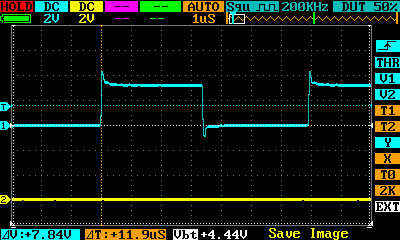Test the thread switching time by implementing semaphore ping-pong between two threads.
Measure thread switching time by implementing semaphore ping-pong between two threads
This mbed program starts two threads with realtime-priority. Each of them is waiting for the other to give its semaphore and gives the other thread's semaphore as a reaction. Once started, this algorithm results in fast thread switches, enforced by the semaphores.
To allow measurement, one thread sets a GPIO output, while to other one clears it.
Measurements are performed on a NUCLEO-F767ZI board https://os.mbed.com/platforms/ST-Nucleo-F767ZI/.
mbed-os-5.12.3
Measured gpio_out output frequency, whitch contains actually two thread switches:
- 6.5 - 7.0 usec (154 kHz - 143 kHz)

main.cpp
- Committer:
- stefanwaldschmidt
- Date:
- 2019-05-11
- Revision:
- 0:ea879e5f3ce5
File content as of revision 0:ea879e5f3ce5:
/*
Test thread switching time using semaphore ping-pong
Hardware: NUCLEO-F767ZI
Libraries:
mbed-os-5.12.3
Measured gpio_out output frequency,
which contains actually two thread switches:
6.5 - 7.0 usec (154 kHz - 143 kHz)
*/
#include "mbed.h"
Semaphore semaphore_on(0);
Semaphore semaphore_off(0);
DigitalOut gpio_out(PC_8);
void run_on()
{
while (true) {
semaphore_on.wait();
gpio_out = 1;
semaphore_off.release();
}
}
void run_off()
{
while (true) {
semaphore_off.wait();
gpio_out = 0;
semaphore_on.release();
}
}
int main()
{
Thread *thread_on = new Thread(osPriorityRealtime);
Thread *thread_off = new Thread(osPriorityRealtime);
thread_on->start(run_on);
thread_off->start(run_off);
semaphore_on.release();
while (true) {
wait(0.1); // 100 ns
}
}